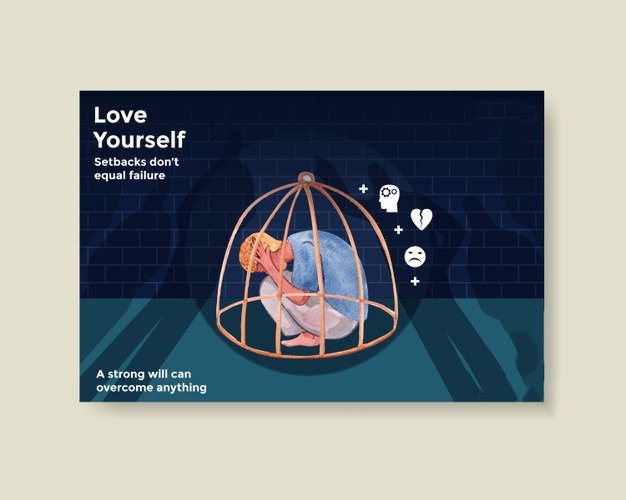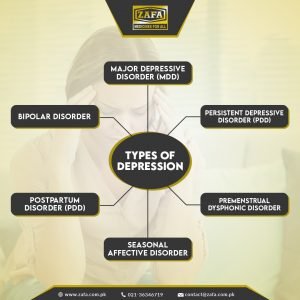
A Deeper Dive into Depression
This mental health awareness month, to take mental health more seriously ZAFA Pharmaceuticals highlights the most common mental illness amongst the society i.e. ‘depression’. The society either glorifies ‘depression’ as something cool or it takes it lightly labeling it as laziness.
In our last blog we got over those wrong perceptions by giving you a brief look into what it is meant by mental illness and by clearing up that depression is a very serious mental health disorder that needs to be kept in check.
In this blog we plan on diving a little deeper and getting to educate ourselves more about depression, how it can be treated and how we as a society can help people suffering from mental illnesses as serious as depression. Let’s again put a few questions into discussion that are very frequently asked, them being:
- Why do they call depression the silent killer?
Many people suffering from depression never seek medical attention during their entire lives. They choose to absorb the burden of depression into their different body systems. What many people don’t understand is that depression is a silent killer when ignored as it can lead to physical symptoms and various diseases at a later stage.
- What is the major cause of depression?
Depression is a complex disease. No one knows exactly what causes it, but it can happen for a variety of reasons, following can be a few out of those: - Physical, sexual, or emotional abuse can put a person at risk of having depression at some point.
- Some drugs can increase the risk of depression in someone.
- Depression in someone who has the biological risk to it can also result from personal conflicts or disputes with family members or friends.
- Sadness or grief after the death or loss of a loved one, though natural, can increase the risk of depression.
- Women are about twice at risk than men to go into depression most likely because the hormonal changes those women go through at different times of their lives play a role.
- A family history of depression may increase the risk.
- The syndrome of clinical depression can be a result in response to stressful life events which include moving, losing a job or income, getting divorced, or retiring and even good events such as starting a new job, graduating, or getting married can lead to depression.
- Problems such as social isolation due to other illnesses or being a cast out can contribute to the risk of developing depression.
- Sometimes, depression may be triggered by another medical condition.
- Even if temporarily drugs or alcohol makes one feel better, they ultimately will aggravate depression which is why nearly 30% of people with problems of substance misuse also have major or clinical depression.

What are the 7 types of depression?
There are many different causes of depression some of which aren’t fully understood by psychology. Let’s go through seven of the well-understood and common types of depression:
- Major Depressive Disorder (MDD):
When people use the term ‘clinical depression’, they are generally referring to MDD. Major depressive disorder is a mood disorder characterized by a number of key features including depressed mood, changes in weight and sleep, lack of interest in activities normally enjoyed, fatigue, suicidal thoughts, feelings of worthlessness, etc. - Persistent Depressive Disorder (PDD):
Dysthymia, now known as persistent depressive disorder, refers to a type of chronic depression present for more days than not for atleast two years. It can be mild, moderate or severe. People might experience brief periods of not feeling depressed, but this relief of symptoms lasts for two months or less. The treatment involves medication and psychotherapy. - Bipolar Disorder:
bipolar disorder is a mood disorder characterized by periods of abnormally elevated mood known as mania. These periodscan be mild (hypomania) or they can be so extreme as to cause marked impairment with a person’s life, require hospitalization or affect a person’s sense of reality meaning them having hallucinations or delusions. - Postpartum Disorder (PDD):
pregnancy can bring about significant hormonal changes that can have its onset during pregnancy or even following the birth of the child. - Premenstrual dysphonic disorder: among the most common symptoms of premenstrual syndrome (PMS) are irritability, fatigue, anxiety, moodiness, bloating, increased appetite, food cravings, aches and breast tenderness.
- Seasonal affective disorder:
if one experiences depression, sleepiness and weight gain during the winter months but feel perfectly fine in spring you may have a condition known as seasonal depressive disorder. - Atypical Disorder:
if one experiences signs of depression (such as over-eating, sleeping too much, or extreme sensitivity to rejection) but then find themselves suddenly perking up in face of a positive event. Then these symptoms point towards the diagnosis chance of having atypical depression also known as a depressive disorder with atypical with atypical features.
- How to get help while going through depression?
Depression drains your energy, sometimes, just thinking about the things you should do to feel better, like exercising, reading, spending time with friends or anything that you enjoy, can seem exhausting or impossible to put into action. The key is to start small and build from there. Taking the first step is always the hardest but here are some things to get you going:
- Reach out to your friends, family and stay as connected as possible.
- Do things that make you feel good.
- Get moving. Exercise, workout, dance or just a simple walk.
- East healthy.
- Challenge your negative thinking.
- Get professional help.
The last one is extremely important. Getting professional help and going for therapy is nothing to be ashamed of instead it is beneficial for each and every one of us in once in a while. For those who are going through mental health problems, therapy and professional help is as essential as food.
As the top pharmaceutical company in Pakistan, Zafa Pharmaceuticals urges the society to be more co-operative and understanding towards the people who are going through tough times of mental health problems. It is important for the people with mental illness to surround themselves with people around them who radiate positive vibes and it is the responsibility of the society to positively handle them.
Again Zafa Pharmaceuticals emphasizes on the fact that there is absolutely no shame in reaching out and asking for help for even the slightest of your mental health problems. We together as a society can strive and help people with mental health problems and lift each of us up.

